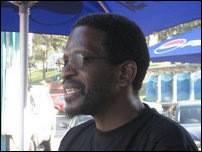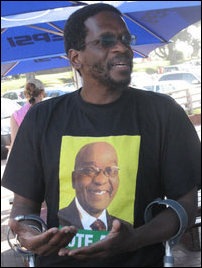 The ruling party of the government of South Africa (ANC) have reiterated calls for a permanent ceasefire in Sri Lanka and acknowledged the need for an independent Tamil homeland. ANC MP and chairmen of the Solidarity Group of Peace and Equality Sisa Njikelana in an interview with Tamilnet, Saturday, has stressed the need for bilateral talks between the Sri Lankan Government and the LTTE, an organisation that articulates the aspirations of the people. “This Government believes that by defeating the LTTE, the Tamils will just automatically fall for any offer given. I look at that with a nice cynical smile”, he said.
The ruling party of the government of South Africa (ANC) have reiterated calls for a permanent ceasefire in Sri Lanka and acknowledged the need for an independent Tamil homeland. ANC MP and chairmen of the Solidarity Group of Peace and Equality Sisa Njikelana in an interview with Tamilnet, Saturday, has stressed the need for bilateral talks between the Sri Lankan Government and the LTTE, an organisation that articulates the aspirations of the people. “This Government believes that by defeating the LTTE, the Tamils will just automatically fall for any offer given. I look at that with a nice cynical smile”, he said.
Just days out from the April 22nd national elections, the MP declared, “I will urge the Sri Lankan president to listen to my democratically elected government and a) Implement a permanent ceasefire, b) revive peace agreements c) Allow humanitarian aid to reach proper destination without hindrance, d) Allow journalists to go and have unhindered and protected access to the war zone, e) to allow NGO’s such as UN agencies back into every corner of Sri Lanka with immediate effect”.
Sri Lanka is part of the global village, and should behave as such, he said.
On the importance of involving the LTTE in any political process, Sisa Njikelana said that LTTE’s role in the prospect of peace is a vital element that the world fails to understand. “History indicates the rise of the LTTE as a mechanism of mobilisation for the Tamil people. They have successfully achieved this role, to the point where comments from the Government illustrate a subtle acknowledgement of the centrality of the LTTE to the Tamil people and their aspirations”, he observed.
On the role of India his response was that India to assume its role as a regional power and should be vocal about the futility of a military solution. However, he said that The ANC and the solidarity group hold firm on its position that only Sri Lanka itself can be central to solving this conflict, and other countries must act as merely facilitators to help achieve a political solution.
Saying that the historical relationship between the ANC & the LTTE dates back to the time when his own party was languishing in exile amid the political turmoil of his country, he appealed to the Tamil Diaspora to not only double, but multiply their efforts from now, as there is always the danger of annihilation.
“The clear statements from government leaders in Colombo that they want nothing else but to decimate the Tamils, would seem impossible to others, but the history endured illustrates that it is indeed possible”, the M.P. said.
Full text of the interview follows:
TamilNet: How do you view the historical and ideological perspectives between the ANC and the LTTE?
Njikelana: The historical relationship between the ANC & the LTTE dates back to the time when our own party was languishing in exile amid the political turmoil of our country. Our two parties share an ideological, social and political commonality that lies within the connection of the people we continue to fight for.
TamilNet: How do you contextualise the struggle of Eezham Tamils and that of South Africa?
Njikelana: Oppressed, exploited, denied their rights, brutalised and massacred when they fought for their rights, these are the common threads between the two people. It is through these injustices that the liberation struggle began for both parties, when the masses chose to reject the imposition of repressive legislation, reject educational and social discrimination, reject being subjugated, and strived for self determination for its people. The blacks of South Africa now enjoy the fruits of freedom, yet the struggle to survive remains a bloody reality for the Tamils in Sri Lanka.
TamilNet: You have said that the Sri Lankan Government must engage in bilateral talks with the LTTE. Why is this?
 Njikelana: It is absolutely clear that any end to the Sri Lankan war must involve bilateral talks with the LTTE. History indicates the rise of the LTTE as a mechanism of mobilisation for the Tamil people. They have successfully achieved this role, to the point where comments from the Government illustrate a subtle acknowledgement of the centrality of the LTTE to the Tamil people and their aspirations. This Government believes that by defeating the LTTE, the Tamils will just automatically fall for any offer given. I look at that with a nice cynical smile. That is what apartheid govt said, they said we broke the back of the ANC, yet year later, we stand as leaders of the great nation of South Africa.
Njikelana: It is absolutely clear that any end to the Sri Lankan war must involve bilateral talks with the LTTE. History indicates the rise of the LTTE as a mechanism of mobilisation for the Tamil people. They have successfully achieved this role, to the point where comments from the Government illustrate a subtle acknowledgement of the centrality of the LTTE to the Tamil people and their aspirations. This Government believes that by defeating the LTTE, the Tamils will just automatically fall for any offer given. I look at that with a nice cynical smile. That is what apartheid govt said, they said we broke the back of the ANC, yet year later, we stand as leaders of the great nation of South Africa.
TamilNet: What impact do you think the banning and demonization of the LTTE by certain countries will have on prospects of peace throughout Sri Lanka?
Njikelana: Again, the LTTE’s role in the prospect of peace is a vital element that the world fails to understand. The Sri Lankan Government continues to use the label of terrorism as a guise to place a lid on an organisation (LTTE) that articulates the aspirations of a people who undeniably have their rights denied. The LTTE should be allowed to stand in front of global community and express themselves, we are mature and intelligent enough to make our decision. When the ANC faced similar bans by the apartheid Government in South Africa, we took our message to the world, and as a result, our struggle swelled from mere tens, to thousands, to millions. We were given the chance to voice our message to international figures, and until the LTTE are given this opportunity, peace remains a distant reality.
TamilNet: How did the ANC view the recent so-called 48 hour ceasefire declared by the Sri Lankan Government?
Njikelana: The pittance of people who left to government areas shows a people who have no trust in the Colombo administration. These people have more trust and hope on the LTTE, a view that corroborates with stories and narrations of civilians that continue to seep through the walls of censorship that has silenced the cries of Tamil civilians.
TamilNet: What is your governments’ reaction to India’s role in providing military and economic support to the Sri Lanka?
Njikelana: The ANC and the solidarity group hold firm on its position that only Sri Lanka itself can be central to solving this conflict, and other countries must act as merely facilitators to help achieve a political solution. India, as a regional superpower should be vocal about the futility of a military solution and the significance of a peaceful political solution. The ANC hope that with true persistent international engagement, India will be persuaded to desist from these actions.
TamilNet: Can you tell us about the Solidarity Group for Peace and Justice that has been set across South Africa?
Njikelana: The Solidarity Group was established on 21st December 2008 by affiliates of the ANC and members of the South African community in response to the fragmentation of Tamil groups, whose continued efforts remain largely unknown to the general public. This group is structured upon a broadfront ideology and acts as an umbrella organisation that encompasses various other social, trade and political organisations to assist in highlighting the genocide being faced by the Tamils in Sri Lanka.
TamilNet: Continued protests across the world by the Tamil Diaspora calling for a permanent ceasefire and the establishment of an independent Tamil homeland have failed to halt the Colombo’s desire for a military solution. Do you think the world will act?
Njikelana: I am appealing to the Tamil Diaspora to not only double, but multiply their efforts from now, to ensure that there is a change in Sri Lanka, both in short term that is an immediate ceasefire, and long term – lasting political solution. The clear statements from government leaders in Colombo that they want nothing else but to decimate the Tamils, would seem impossible to others, but the history endured illustrates that it is indeed possible. The international community and global bodies are rather lethargic about this issue, and I make a call to the Tamil Diaspora that they must continue solidarity group in their nations, to mobilise themselves in a truthful and responsible way to voice the destruction of their brethren.
TamilNet: The ANC currently stands on the brink of a historic win in South Africa. If the party is successful, what will be the dialogue between your government and that of Sri Lanka?
Njikelana: I will urge the Sri Lankan president to listen to my democratically elected government and a) Implement a permanent ceasefire, b) revive peace agreements c) Allow humanitarian aid to reach proper destination without hindrance, d) Allow journalists to go and have unhindered and protected access to the war zone, e) to allow NGO’s such as UN agencies back into every corner of Sri Lankan with immediate effect. Sri Lanka is part of the global village, and should behave as such.
(For updates you can share with your friends, follow TNN on Facebook and Twitter )
